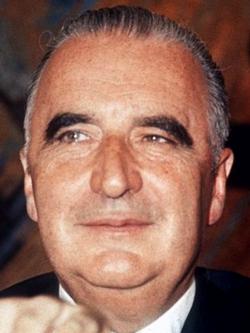
Cause of death: Waldenström's disease
Georges Jean Raymond Pompidou ( POMP-id-oo; French: [ʒɔʁʒ(ə) pɔ̃pidu] ; 5 July 1911 – 2 April 1974) was a French politician who served as President of France from 1969 to his death in 1974. He previously served as Prime Minister of France under President Charles de Gaulle from 1962 to 1968, a longevity record under the Fifth Republic.
In the context of the strong growth of the last years of the Trente Glorieuses, Pompidou continued De Gaulle's policy of modernisation, which was symbolised by the presidential use of the Concorde, the creation of large industrial groups and the launch of the high-speed train project (TGV). The government invested heavily in the automobile, agribusiness, steel, telecommunications, nuclear and aerospace sectors and also created the minimum wage (SMIC) and the Ministry of the Environment.
His foreign policy was pragmatic but in line with the Gaullist principle of French autonomy within the Western Bloc. It was marked by a warming of relations with Richard Nixon's United States, close relations with Leonid Brezhnev's Soviet Union, the launch of the snake in the tunnel and the relaunching of European construction by facilitating the United Kingdom's entry to the EEC in contrast to de Gaulle's opposition. Pompidou died in office in 1974 of Waldenström's disease, a rare form of blood cancer.
An admirer of contemporary art, Pompidou's name remains known worldwide for the Centre Pompidou, which he initiated and was inaugurated in 1977; it subsequently spread the name with its branches in Metz (France), Málaga (Spain), Brussels (Belgium) and Shanghai (China). A Georges Pompidou Museum is also dedicated to him in his hometown.
Source : Wikipedia